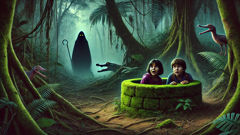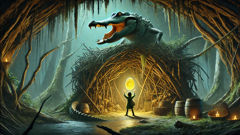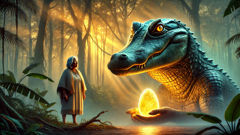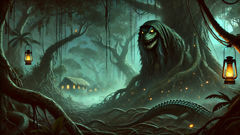Introduction
In the Brazilian countryside, where the Atlantic Forest breathes with the humid perfume of earth and wild orchids, the night carries stories as thick as the mist that weaves between ancient trees. Among the tales passed down by candlelight and crackling fire, none chills the soul quite like that of the Cuca. More than a simple bedtime warning, her legend grows from the deep fears and quiet wisdom of generations—woven into the lullabies sung by anxious mothers, whispered at dusk by elders whose eyes remember a thousand shadows. They say the Cuca is no mere specter: she is a cunning witch, with the leathery snout and glassy stare of an alligator, her scales shifting with the colors of moonlight and moss. She slips through the tangled undergrowth when children ignore their parents, when laughter grows too wild past nightfall, when disobedience flickers in the hearts of the young. For centuries, children have shivered at the thought of her claws scraping against wooden shutters, her hiss curling beneath doors, promising that the wicked and the willful will vanish before dawn. Yet, for all her horror, the Cuca is more than a monster—she is a lesson, carved from the heart of Brazil’s forests, teaching that courage and kindness may bloom even in darkness. To understand her is to journey into the tangled roots of fear and folklore, where every shadow holds a secret, and every secret holds a chance for redemption.
Whispers at Dusk: The Children of Vila das Águas
Vila das Águas was a cluster of modest wooden homes perched at the edge of the Atlantic Forest, where the trees pressed so close they seemed to listen in on every human secret. Chickens clucked in dusty yards, smoke from cooking fires curled lazily into the sky, and children’s laughter echoed through the winding dirt paths. Among them were twins, Lena and Caio, as alike in mischief as in appearance: both with wide brown eyes, tangled curls, and quick feet that scampered faster than any scolding voice. The village thrived on routine—chores at dawn, school with Dona Celeste in her thatched hut, and evenings punctuated by the gentle discipline of their mother, Dona Marisa. Yet as the sun dipped below the treetops, a hush crept over Vila das Águas, and mothers’ voices grew sharp with warning. “Venham logo! Come home now, or the Cuca will take you!”

The legend was ever-present, stitched into the very air. Dona Marisa would sing softly to the twins as they drifted to sleep, her lullabies laced with caution: “Nana neném, que a Cuca vem pegar...” Sometimes, Lena would ask, voice trembling more from curiosity than fear, “Mamãe, is the Cuca real?” Dona Marisa would tuck them close, her face shadowed by firelight. “The forest is deep and old,” she’d reply. “Some things live there that we don’t understand. Best not to tempt fate.”
One humid afternoon, when the twins’ chores were done and the forest called with promises of adventure, Lena convinced Caio to slip away for just a little while. “We’ll be back before sunset,” she said, certain. “We’ll find the blue morpho butterflies by the creek.” Their mother’s warnings drifted from memory as their laughter faded into the trees. The world inside the forest was wilder, richer—giant ferns towered overhead, and roots twisted beneath their bare feet. The creek bubbled with clear water and darting fish. It was only when a strange hush fell that Lena’s heart stuttered. The air felt colder, the shadows longer.
Suddenly, Caio pointed to a shape in the undergrowth—a nest of reeds disturbed, scales glinting in the last rays of sun. Something slithered just out of sight. A low, guttural hiss curled through the stillness. Lena grabbed her brother’s hand, but the way home was already lost in a tangle of roots and creeping vines. Fear pressed in, heavy as the coming night. They ran, branches clawing at their arms, until they stumbled upon an ancient stone well choked with moss. Here, the forest felt older, thicker—every sound magnified by dread. Lena peered into the gloom and, for a heartbeat, saw two yellow eyes watching from beneath the water’s surface.
The children clung to each other, breathless. The stories of the Cuca no longer felt like mere threats but warnings carried on the wind. Night was falling fast, and with it, the promise that something old and hungry hunted beneath the canopy.
The Cuca’s Lair: Shadows, Bargains, and Secrets
As the first stars appeared, Lena and Caio’s panic grew. Every snap of a twig sounded like claws on bark. The forest seemed to breathe around them—alive, watchful. When they dared to move, they stumbled into a clearing suffused with eerie green light. In the center loomed a crooked hut built from twisted branches and alligator bones, draped in hanging moss. The air buzzed with a strange, almost metallic scent. The twins froze. Something ancient and powerful lived here. Then, from behind a curtain of vines, the Cuca emerged. She was taller than any woman, hunched and draped in rags that shifted like shadows. Her skin shimmered with scales that caught the moonlight, and her head was unmistakably that of an alligator—long snout, jagged teeth, and eyes that burned yellow and unblinking.

She spoke in a rasping voice that echoed from the swampy ground. “Ah, what have we here? Naughty little children, wandering where you shouldn’t be.” Her laughter was a low growl, and her claws gleamed as she beckoned them forward. Lena tried to shield Caio, standing firm though her knees shook. “We’re sorry,” she whispered. “We just wanted to see the butterflies.”
The Cuca circled them slowly, tail swishing. “Curiosity is a dangerous thing in these woods. Didn’t your mother warn you?” She stooped, staring into Lena’s eyes. “But perhaps you can be useful before I decide what to do with you.”
She explained that her powers were bound by rules older than the trees themselves. She could not cross running water, nor could she harm those who showed true courage or kindness. Yet her hunger for disobedient children was legendary—she claimed it was not out of malice but necessity. “The world must be kept in balance,” she hissed. “Disobedience brings chaos. I am the shadow that follows mischief.”
Lena’s mind raced. She remembered stories—how some children escaped the Cuca through wit and bravery. With trembling voice, she offered a bargain: “If we help you find something you’ve lost, will you let us go?” The Cuca’s eyes narrowed. “What could you possibly find for me?”
The twins recalled old tales of a magical egg hidden deep within the forest, said to grant wishes or restore power to whoever possessed it. Rumor claimed the Cuca once owned such an egg, but it was stolen by a clever armadillo years ago. If they could retrieve it, perhaps she would spare them.
The witch agreed—her claws curling impatiently. She released them from her grasp, but her warning lingered: “If you fail or try to escape, I will find you before dawn.”
Guided by fragments of stories, Lena and Caio set off into the night. The forest had changed; now it pulsed with unseen eyes and rustling branches. Every step was a trial of courage. They followed a path of bioluminescent mushrooms, crossed a narrow log bridge over a black stream, and solved riddles posed by talking frogs and a grumpy owl who guarded a fork in the trail.
At last, beneath the roots of a giant fig tree, they found the armadillo’s burrow. The creature, old and wise, agreed to give back the egg—if they could answer his challenge: “What is the greatest power in the forest?”
Lena thought of her mother’s lullabies and the strength in her brother’s trembling hand. “Kindness,” she answered. “Because even in darkness, it gives us hope.”
The armadillo smiled, revealing the shimmering egg. “You have answered well. Take this and remember—bravery and kindness are stronger than fear.”
Clutching the egg, the twins hurried back to the Cuca’s lair, hearts pounding.
Dawn’s Redemption: Breaking the Curse of the Cuca
The journey back was fraught with fear and fatigue. Lena’s arms ached as she held the glowing egg close, and Caio’s legs trembled with every step. The forest felt even more alive than before—branches swayed though no wind blew, shadows lengthened with each hurried breath. Somewhere behind them, the Cuca’s presence lingered, palpable in every rustle and hiss. Yet, with the magical egg lighting their path, the children pressed on.

When they returned to the clearing, dawn was just beginning to warm the horizon. The Cuca awaited them by her hut, her silhouette stark against the pale glow. Her eyes widened at the sight of the egg, and for a fleeting moment, her monstrous features softened. “You found it,” she rasped, voice almost wistful.
Lena held out the egg. “You promised to let us go if we returned it.”
The Cuca took the egg gently, claws surprisingly careful. As she cradled it, something extraordinary happened—the scales on her arms shimmered and shifted, softening into smoother skin. Her hunched back straightened. She let out a long, shuddering breath, and her eyes lost some of their predatory gleam.
She explained, her voice less guttural now, that she had not always been a monster. Long ago, before greed and bitterness twisted her spirit, she was a guardian of the forest, protecting children and creatures alike. The loss of the egg—a symbol of trust—had cursed her, binding her to the shadows and making her a thing of fear. Only an act of true courage and kindness could restore what was lost.
The twins listened in awe as the Cuca’s story spilled forth. She spoke of how legends could shape a soul, how fear could trap both the hunted and the hunter. “You have shown more bravery than many grown folk,” she said quietly. “Your kindness has freed me.”
With sunrise peeking through the trees, the Cuca’s transformation completed. She was no longer the terrifying alligator witch but an old woman with deep-set, wise eyes and a gentle smile. She gave Lena and Caio a blessing: “May you always walk in the light, even when shadows beckon.”
The children hurried home, hearts light with relief and wonder. The village woke to find them safe, and Dona Marisa wept with joy, hugging them fiercely. That night, as they sat by the fire, Lena recounted their adventure. The elders listened, their eyes shining with pride and understanding.
The legend of the Cuca changed in Vila das Águas. Mothers still sang their warning lullabies, but now children listened more closely—to their parents’ wisdom, to the wild beauty of the forest, and to their own hearts’ capacity for courage and kindness.
Conclusion
The legend of the Cuca endures in Brazil not just as a tale to frighten children into obedience, but as a living memory of courage, compassion, and the mysterious ties that bind people to the land and to each other. In Vila das Águas, Lena and Caio grew into storytellers themselves, their voices carrying a new version of the tale—one where monsters can be redeemed, and where even in darkness, light persists. The Cuca’s story reminds us that fear is not always an enemy; sometimes, it is a guide, leading us to bravery we didn’t know we possessed. And so, when the forest hums with secrets at night and the lullabies drift through open windows, children listen not only for threats but for hope. The witch with the alligator’s head is gone, but her lessons echo still—urging each new generation to walk bravely between the shadows, holding kindness like a lantern against the dark.













